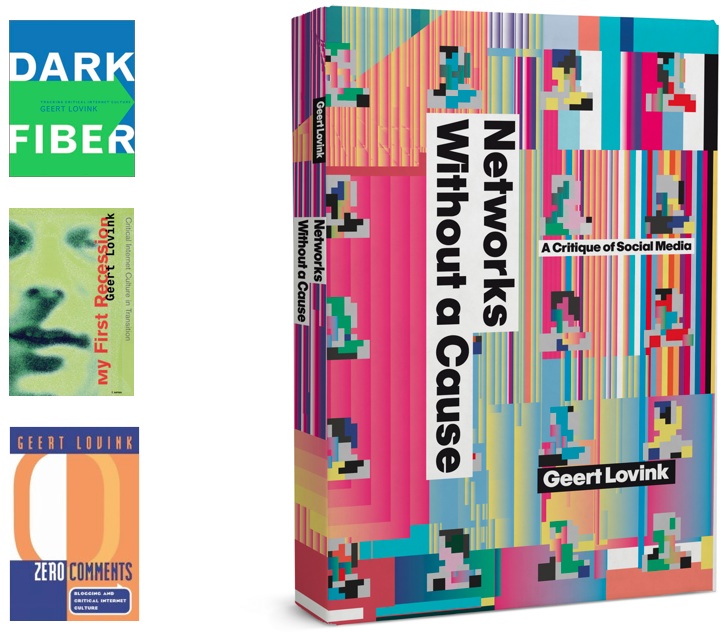
With the recent furore over The Guardian and Washington Post’s revelations about PRISM, and the apparent willingness of pretty much every large tech company to give the US government direct access to its servers, I’ve been mulling on a great book that Barry Taylor recommended to me: Geert Lovink’s Networks Without A Cause.
It’s perhaps the first academic look at the consequences of social media, and our compulsion to engage with it. I actually quote it in Mutiny, in a section on the practical implications of ‘going on the account’ and living out some of these pirate principles. Quote:
‘We are honoured to be invited by the Machine to submit our opinions and preferences. We give in to the pressure to categorize data and join the swarms of ‘collective intelligence.’ Donate your wisdom to the crowds. We are invited to create reading lists, rank music and evaluate the products we consumed. User bees working for queen Google. It is so tempting to become part of the online ‘pollination’ world, as French economist Yann Moulier coined it, with billions of users acting like bees that fly from one website to the other, adding value for the owners.’ (Networks Without A Cause – p. 25)
‘There are political reasons to support such initiatives (as the open source social network Diaspora). I don’t want to overstate the CIA’s role, but it is well known that activists must be very cautious using Facebook. For a while it was OK to spread the message for this or that campaign, but Facebook is becoming too dangerous as an internal channel to coordinate civil disobedience. […] Let’s strengthen the self-determination of the nodes against the cloud’s central authority and keep the Web decentralized.’ ibid. p. 31
Clearly there have been suspicions for a while that social networks were being bugged by governments, but PRISM seems to offer evidence of this on a massive scale, and completely untargeted. But in a way we perhaps not be surprised at this, because these tech companies tend to be completely in line with the government’s agenda. The technology writer Stephen Johnson noted in an interview in Wired:
With Facebook we are ultimately just tenant farmers on the land; we make it more productive with our labor, but the ground belongs to someone else.’
The pirate move of self-determination resists this enclosing of our labour into tenancy, and promotes taking control of the means of production. But it also advocates a basic principle of human freedom: to be able to act ‘off the map’ without the constant snooping intervention of governments. This is what their ‘TAZ’ states were, and what Lovink connects to:
‘In the past, emphasis was placed on creating spaces (such as parties and squats), while the TAZ of the contemporary age will emphasize the first element, it’s temporary nature, and celebrate Chronos, the art of the longue durée. After slow food, slow communication…’ Networks Without A Cause – p. 29.
There is an odd connection here. In my recent TED talk I spoke about the encroaching privatisation of our world: we drive around in private cars, mow our private lawns in an economy rigged for private gain… But all of this economic privatisation appears to be paralleled with a total removal of social privacy. Why? Because the former keeps the rich in power, and the latter threatens their position. The only thing that can remain private are evidence of the state’s secrets – and yet these ‘secrets’ are already fully known: abuse and violence against civilians and serious contraventions of military protocols.
This militarisation of everyday life – the use of military grade tools to control mass-populations in peace time – is horrible. And combined with our compulsion to use the web, a dangerous mix.
Odd times.
You can get Mutiny! here, and watch the TED talk here.
Comments
One response to “Playing Pirate with the Web | Privacy, Privatisation and Militarisation”
I’m really interested in these topics too Kester. Have you read this NYT opinion piece on “collaborative consumption?”
http://opinionator.blogs.nytimes.com/2013/06/05/its-not-just-nice-to-share-its-the-future/
It’s interesting, and is sort of related to what you’re talking about, in the sense that it has to do with economic privatization, which it actually seems to dispute.
The piece references Lisa Gansky’s book. She makes a distinction between “full mesh” (company owns the stuff, people buy access) and “own-to-mesh” (no centrally owned stuff, people rent what they own) businesses. Both are interesting concepts and seem to point to one thing: sharing is the future.
Also, Jeff Jarvis (http://www.youtube.com/watch?v=aHw9gCaPeNw) is a good counter voice to the negative criticisms of internet privacy. In his book Public Parts he seems to be pretty optimistic about the loss of privacy and the benefits of publicness. But I do share some of your concerns, no doubt.